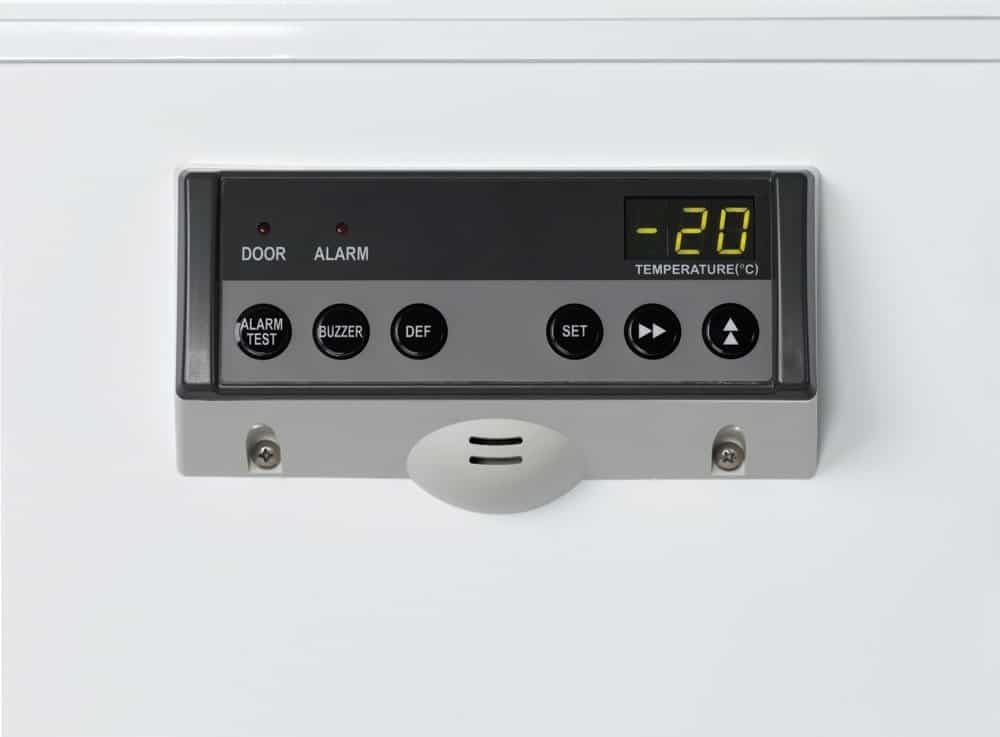Purchasing a new refrigerator or freezer for your lab is a big investment, which means it’s important to do your homework and carefully think about what you need — and what you don’t. From temperature controls to monitoring capabilities and capacity, taking the following considerations into account will help you select the right cold storage product. At the end of the day, the last thing you need are any scheduling delays — or worse, having to send your equipment back because you didn’t order the right model.
Before we outline the key considerations, let’s first examine these laboratory products on a general level.
In the most basic terms, laboratory refrigerators and laboratory freezers are cold storage products that can maintain precise temperature uniformity and control. They include the following:
-
- Refrigerators
- Ultra-low freezers
- -20°C to -40° freezers
- Cryogenic storage
- Walk-in coolers
They are specifically designed for laboratory use and differ from the types of refrigerators and freezers found in most homes. Cold storage products in labs are typically used for storing the following:
- Samples
- Biological material
- Pharmaceutical storage
- Vaccines
Types of Laboratory Refrigerators
- Upright/undercounter
- Vaccine
- Medical
- Laboratory
- Pharmaceutical
- Combination units
- Chromatography
- Flammable material storage
- Hazardous location models
Types of Laboratory Freezers
- Ultra-low (-80°C)
- Upright/undercounter
- Auto defrost
- Manual defrost
- Flammable material storage
- Hazardous location models
Classifications & Guidelines
Most laboratory refrigerators and freezers must adhere to specific guidelines. Here are some of the most common:
- CDC Vaccine Storage and Handling Guidelines
- Vaccines for Children (VFC) Program
- Pfizer-BioNTech COVID-19 Vaccine Storage and Handling Summary
- Moderna COVID-19 Vaccine Storage and Handling Summary
- Guidelines for Safe Work Practices in Human and Animal Medical Diagnostic Laboratories
- U.S. Food and Drug Administration
- Storage and Handling of Immunobiologics
- National Fire Protection Association (for flammable material storage freezers)
- Occupational Safety and Health Administration (for hazardous location models)
- Americans with Disabilities Act (for some cold storage units)
10 Key Considerations When Buying a Laboratory Refrigerator or Freezer
1. Temperature ranges
One of the most important factors to determine up front is the temperature range you need, which will largely depend on what you are planning to preserve or store in the unit.
Lab freezers typically have a range of -15°C to -25°C, but some units offer a range of -18°C to -40°C. Ultra-low freezers, which are designed to preserve biological samples, typically have a range of -50°C to -86°C.
For vaccine storage, according to the CDC, refrigerators should maintain temperatures between 2°C and 8°C. Freezers should maintain temperatures between -15°C and -50°C. They specify that “refrigerator or freezer thermostats should be set at the factory-set or midpoint temperature, which will decrease the likelihood of temperature excursions.” It’s important to double-check your temperature requirements to ensure the model you’re looking at fits your exact needs.
2. Temperature recording and temperature alarms
Alarms are extremely important because they can alert you if there’s a problem with your unit. This is especially important if you aren’t physically present in the lab, since temperature fluctuations can harm samples — which may lead you to ultimately discard them.
3. Manual and auto defrost
If you’re looking for a freezer, it’s important to think about whether you need manual or auto defrost. Auto defrost freezers are maintenance-free, but they may not be the best choice for storing valuable samples. Many people also assume auto defrost freezers are more efficient, but it’s important to know they can have large swings in temperature.
4. Size/capacity
How much storage do you need? You want to think about your current needs, but also your future ones. If you’re looking for a space-saving design, consider smaller undercounter and countertop models. It’s important to note, however, that refrigerators — regardless of what they are storing — work best when loaded at a capacity between 30% and 80%, according to Accucold.
5. Accessibility
Not only do you want to think about what type of equipment you’ll need, but you should also consider where it will be stored in your lab. Can you and your lab personnel easily access the refrigerator or freezer? Can you open the door without any obstruction? Before you purchase any type of cold storage, make sure you consider the dimensions of the unit and the available space in your lab.
6. Ventilation
Make sure you understand the unit’s ventilation needs before you purchase. Can your unit ventilate in your lab without any restrictions? Will your lab personnel be able to clean and maintain the ventilation space?
7. Monitoring systems
When researching cold storage products, you should look for models that offer audible and visual alarms and an access port for temperature monitoring. Why is this so important? NIST projects that 35% of vaccines shipped globally are wasted because they are transported or stored at extreme temperatures — either too high or too low.
8. Optional lab refrigerator components
You may also want to consider some optional components, depending on your type of research and laboratory needs. Some popular considerations include:
- Glass vs. solid doors
- Additional shelving
- Door locks
- Security features
- Drawers instead of shelving
- Sensor ports
9. Special feature lab refrigerators and freezers
This refers to flammable and/or explosion-proof (hazardous location) cold storage units. A flammable storage model is one where there are no electrical components located in the interior of the unit. The compressor’s electrical components have been sealed in a vapor-proof enclosure. These units meet NFPA and OSHA guidelines.
An explosion-proof (hazardous location) model is one where all spark-generating electrical components and connections (such as the compressor and thermostat) are isolated and sealed in vapor-proof enclosures. Electrical wiring is hardwired for additional safety measures.
10. Energy-efficiency
Laboratory refrigerators and freezers typically consume a lot of energy. If you’re in the market for a sustainable cold storage product, you should check whether your choices have the ENERGY STAR® label, which will ensure that your units have the latest in energy-saving features.
ENERGY STAR® units reduce energy consumption through the use of more efficient compressors, advanced microprocessor controllers, and innovative refrigerants.
D.A.I. Scientific Is Your Trusted Cold Storage Equipment Provider
We have a long history of working with market-leading manufacturers to provide cold storage products to analytical laboratories in the pharmaceutical, education, biotechnology and clinical industries. Whether you’re looking to replace one piece of equipment, or you’re outfitting a new lab, we can help. Our factory-trained sales representatives have the specialized knowledge to answer your questions and help you pick out the correct equipment.
FAQs
Q: What temperature range is required for vaccines?
A: According to the CDC, refrigerated vaccines should be stored between 2°C and 8°C with an ideal temperature of 5°C. Frozen vaccines have a temperature range of -15°C and -50°C.
Q: What is the difference between gravity and forced air flow equipment?
A: A forced air flow unit has a fan in the chamber. Moving of the air helps with temperature uniformity. A gravity unit does not have a fan.
Q: What are some examples of ventilation requirements?
A: In general, most refrigerators and freezers need at least 4″ of open space on all sides. An exception to this rule would be a built-in undercounter. These types of units to not need any additional space around the unit.
Q: What features should I consider?
A: It depends on your work and what’s most important to you. Alarms and temperature monitoring systems are especially important, and if energy-efficiency is high on your list, opt for a more sustainable model. If you have questions about whether you need specific features, it’s best to reach out to your sales representative.
Q: How much cold storage capacity do I need?
A: You need to think about your current needs, as well as your future ones. Our models come in a range of sizes with capacities from 1 to 72 cubic square feet.



